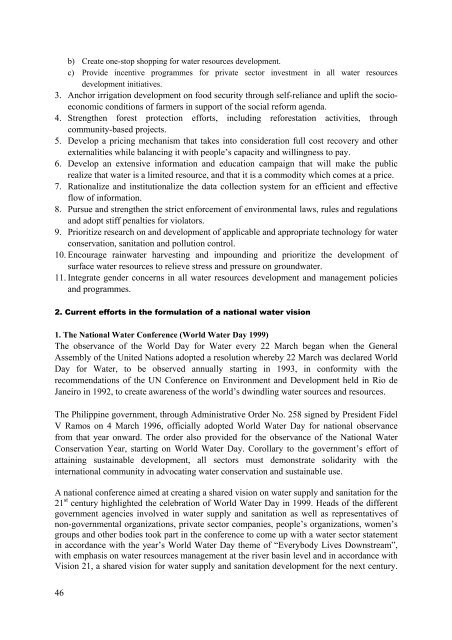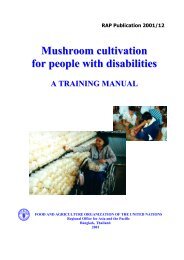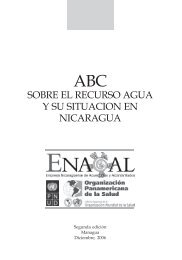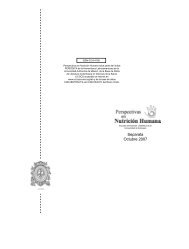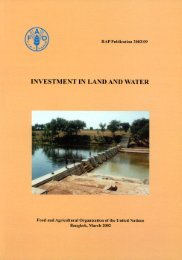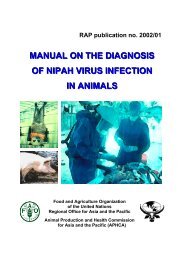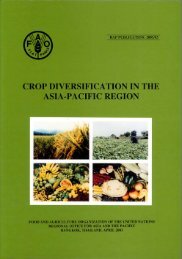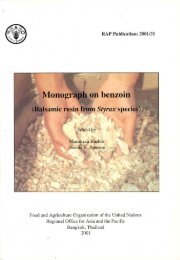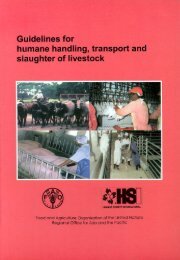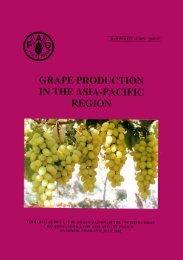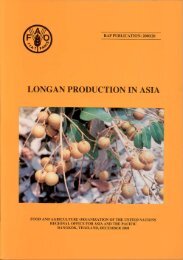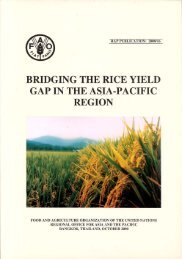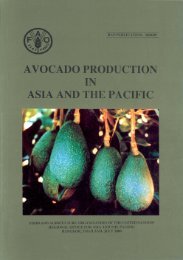The FAO-ESCAP pilot project on national water visions. From vision ...
The FAO-ESCAP pilot project on national water visions. From vision ...
The FAO-ESCAP pilot project on national water visions. From vision ...
You also want an ePaper? Increase the reach of your titles
YUMPU automatically turns print PDFs into web optimized ePapers that Google loves.
) Create <strong>on</strong>e-stop shopping for <strong>water</strong> resources development.<br />
c) Provide incentive programmes for private sector investment in all <strong>water</strong> resources<br />
development initiatives.<br />
3. Anchor irrigati<strong>on</strong> development <strong>on</strong> food security through self-reliance and uplift the socioec<strong>on</strong>omic<br />
c<strong>on</strong>diti<strong>on</strong>s of farmers in support of the social reform agenda.<br />
4. Strengthen forest protecti<strong>on</strong> efforts, including reforestati<strong>on</strong> activities, through<br />
community-based <str<strong>on</strong>g>project</str<strong>on</strong>g>s.<br />
5. Develop a pricing mechanism that takes into c<strong>on</strong>siderati<strong>on</strong> full cost recovery and other<br />
externalities while balancing it with people’s capacity and willingness to pay.<br />
6. Develop an extensive informati<strong>on</strong> and educati<strong>on</strong> campaign that will make the public<br />
realize that <strong>water</strong> is a limited resource, and that it is a commodity which comes at a price.<br />
7. Rati<strong>on</strong>alize and instituti<strong>on</strong>alize the data collecti<strong>on</strong> system for an efficient and effective<br />
flow of informati<strong>on</strong>.<br />
8. Pursue and strengthen the strict enforcement of envir<strong>on</strong>mental laws, rules and regulati<strong>on</strong>s<br />
and adopt stiff penalties for violators.<br />
9. Prioritize research <strong>on</strong> and development of applicable and appropriate technology for <strong>water</strong><br />
c<strong>on</strong>servati<strong>on</strong>, sanitati<strong>on</strong> and polluti<strong>on</strong> c<strong>on</strong>trol.<br />
10. Encourage rain<strong>water</strong> harvesting and impounding and prioritize the development of<br />
surface <strong>water</strong> resources to relieve stress and pressure <strong>on</strong> ground<strong>water</strong>.<br />
11. Integrate gender c<strong>on</strong>cerns in all <strong>water</strong> resources development and management policies<br />
and programmes.<br />
2. Current efforts in the formulati<strong>on</strong> of a nati<strong>on</strong>al <strong>water</strong> visi<strong>on</strong><br />
1. <str<strong>on</strong>g>The</str<strong>on</strong>g> Nati<strong>on</strong>al Water C<strong>on</strong>ference (World Water Day 1999)<br />
<str<strong>on</strong>g>The</str<strong>on</strong>g> observance of the World Day for Water every 22 March began when the General<br />
Assembly of the United Nati<strong>on</strong>s adopted a resoluti<strong>on</strong> whereby 22 March was declared World<br />
Day for Water, to be observed annually starting in 1993, in c<strong>on</strong>formity with the<br />
recommendati<strong>on</strong>s of the UN C<strong>on</strong>ference <strong>on</strong> Envir<strong>on</strong>ment and Development held in Rio de<br />
Janeiro in 1992, to create awareness of the world’s dwindling <strong>water</strong> sources and resources.<br />
<str<strong>on</strong>g>The</str<strong>on</strong>g> Philippine government, through Administrative Order No. 258 signed by President Fidel<br />
V Ramos <strong>on</strong> 4 March 1996, officially adopted World Water Day for nati<strong>on</strong>al observance<br />
from that year <strong>on</strong>ward. <str<strong>on</strong>g>The</str<strong>on</strong>g> order also provided for the observance of the Nati<strong>on</strong>al Water<br />
C<strong>on</strong>servati<strong>on</strong> Year, starting <strong>on</strong> World Water Day. Corollary to the government’s effort of<br />
attaining sustainable development, all sectors must dem<strong>on</strong>strate solidarity with the<br />
internati<strong>on</strong>al community in advocating <strong>water</strong> c<strong>on</strong>servati<strong>on</strong> and sustainable use.<br />
A nati<strong>on</strong>al c<strong>on</strong>ference aimed at creating a shared visi<strong>on</strong> <strong>on</strong> <strong>water</strong> supply and sanitati<strong>on</strong> for the<br />
21 st century highlighted the celebrati<strong>on</strong> of World Water Day in 1999. Heads of the different<br />
government agencies involved in <strong>water</strong> supply and sanitati<strong>on</strong> as well as representatives of<br />
n<strong>on</strong>-governmental organizati<strong>on</strong>s, private sector companies, people’s organizati<strong>on</strong>s, women’s<br />
groups and other bodies took part in the c<strong>on</strong>ference to come up with a <strong>water</strong> sector statement<br />
in accordance with the year’s World Water Day theme of “Everybody Lives Downstream”,<br />
with emphasis <strong>on</strong> <strong>water</strong> resources management at the river basin level and in accordance with<br />
Visi<strong>on</strong> 21, a shared visi<strong>on</strong> for <strong>water</strong> supply and sanitati<strong>on</strong> development for the next century.<br />
46


